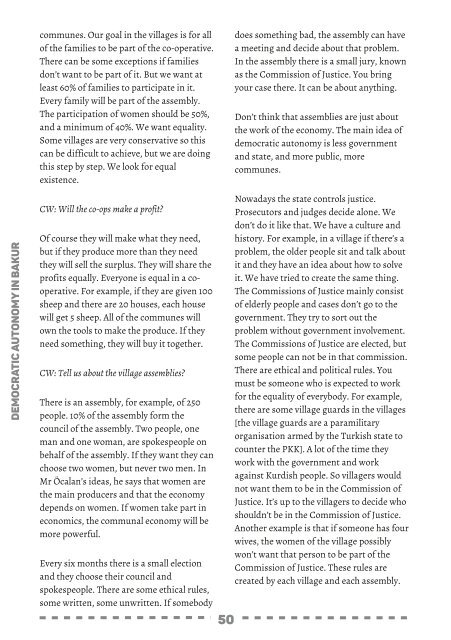STRUGGLES
Struggles-for-autonomy-in-Kurdistan
Struggles-for-autonomy-in-Kurdistan
Create successful ePaper yourself
Turn your PDF publications into a flip-book with our unique Google optimized e-Paper software.
democratic autonomyin bakur<br />
communes. Our goal in the villages is for all<br />
ofthe families to be part ofthe co-operative.<br />
There can be some exceptions iffamilies<br />
don’t want to be part ofit. But we want at<br />
least 60% offamilies to participate in it.<br />
Every family will be part ofthe assembly.<br />
The participation ofwomen should be 50%,<br />
and a minimum of40%. We want equality.<br />
Some villages are very conservative so this<br />
can be difficult to achieve, but we are doing<br />
this step by step. We look for equal<br />
existence.<br />
CW: Will the co-ops make a profit?<br />
Ofcourse they will make what they need,<br />
but ifthey produce more than they need<br />
they will sell the surplus. They will share the<br />
profits equally. Everyone is equal in a cooperative.<br />
For example, ifthey are given 100<br />
sheep and there are 20 houses, each house<br />
will get 5 sheep. All ofthe communes will<br />
own the tools to make the produce. Ifthey<br />
need something, they will buy it together.<br />
CW: Tell us about the village assemblies?<br />
There is an assembly, for example, of250<br />
people. 10% ofthe assembly form the<br />
council ofthe assembly. Two people, one<br />
man and one woman, are spokespeople on<br />
behalfofthe assembly. Ifthey want they can<br />
choose two women, but never two men. In<br />
Mr Öcalan’s ideas, he says that women are<br />
the main producers and that the economy<br />
depends on women. Ifwomen take part in<br />
economics, the communal economy will be<br />
more powerful.<br />
Every six months there is a small election<br />
and they choose their council and<br />
spokespeople. There are some ethical rules,<br />
some written, some unwritten. Ifsomebody<br />
50<br />
does something bad, the assembly can have<br />
a meeting and decide about that problem.<br />
In the assembly there is a small jury, known<br />
as the Commission ofJustice. You bring<br />
your case there. It can be about anything.<br />
Don’t think that assemblies are just about<br />
the work ofthe economy. The main idea of<br />
democratic autonomy is less government<br />
and state, and more public, more<br />
communes.<br />
Nowadays the state controls justice.<br />
Prosecutors and judges decide alone. We<br />
don’t do it like that. We have a culture and<br />
history. For example, in a village ifthere’s a<br />
problem, the older people sit and talk about<br />
it and they have an idea about how to solve<br />
it. We have tried to create the same thing.<br />
The Commissions ofJustice mainly consist<br />
ofelderly people and cases don’t go to the<br />
government. They try to sort out the<br />
problem without government involvement.<br />
The Commissions ofJustice are elected, but<br />
some people can not be in that commission.<br />
There are ethical and political rules. You<br />
must be someone who is expected to work<br />
for the equality ofeverybody. For example,<br />
there are some village guards in the villages<br />
[the village guards are a paramilitary<br />
organisation armed by the Turkish state to<br />
counter the PKK]. A lot ofthe time they<br />
work with the government and work<br />
against Kurdish people. So villagers would<br />
not want them to be in the Commission of<br />
Justice. It’s up to the villagers to decide who<br />
shouldn’t be in the Commission ofJustice.<br />
Another example is that ifsomeone has four<br />
wives, the women ofthe village possibly<br />
won’t want that person to be part ofthe<br />
Commission ofJustice. These rules are<br />
created by each village and each assembly.


